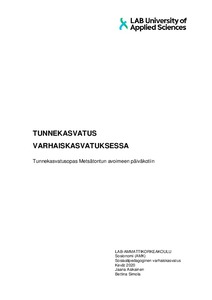Tunnekasvatus varhaiskasvatuksessa : tunnekasvatusopas Metsätontun avoimeen päiväkotiin
Asikainen, Jaana; Simola, Bettina (2020)
Asikainen, Jaana
Simola, Bettina
2020
All rights reserved. This publication is copyrighted. You may download, display and print it for Your own personal use. Commercial use is prohibited.
Julkaisun pysyvä osoite on
https://urn.fi/URN:NBN:fi:amk-202004084757
https://urn.fi/URN:NBN:fi:amk-202004084757
Tiivistelmä
Opinnäytetyön tarkoituksena oli kehittää varhaiskasvattajien valmiuksia tunnekasvatuksen toteuttamisessa. Tarkoituksena oli myös antaa varhaiskasvattajille valmiuksia tukea vanhempia lasten tunteiden käsittelyssä. Tavoitteena oli tuottaa tunnekasvatusopas Metsätontun avoimeen päiväkotiin.
Tunteet ja tunnetaidot ovat tärkeitä jo pienille lapsille heidän kokonaisvaltaisen kehityksensä vuoksi. Kehitys on yksilöllistä, mitä pienemmästä lapsesta on kyse, sitä enemmän hän tarvitsee aikuisen, joko vanhemman tai varhaiskasvattajan tukea opetellessaan tunnetaitoja. Tunteiden tunnistaminen, sanoittaminen ja säätely lisäävät lapsen mielen hyvinvointia ja vähentävät aggressiivista käytöstä.
Opinnäytetyö oli toiminnallinen, ja sen suunnittelussa käytettiin laadullisia menetelmiä. Aineisto kerättiin Metsätontun kahdelle varhaiskasvattajalle tehdyllä avoimella parihaastattelulla. Haastattelu litteroitiin propositiotasoisesti kirjaamalla haastattelun pääkohdat. Litteroitu aineisto analysoitiin teemoittelun avulla. Tulosten perusteella tunnekasvatusoppaaseen koottiin monipuolisesti tunnekasvatuksen toteuttamista helpottavia ohjeita palvelemaan toimeksiantajan tarpeita.
Toimeksiantajalta saadun palautteen mukaan voidaan todeta, että tunnekasvatusoppaalle asetut tavoitteet täyttyivät. Opas on käytännöllinen, helppolukuinen ja esteettisesti houkutteleva. Opas tulee avoin päiväkoti Metsätontun päivittäiseen käyttöön ja oppaan avulla on mahdollista antaa vanhemmille tukea ja konkreettisia ohjeita lasten tunnekasvatukseen liittyen. The purpose of this thesis was to develop the skills of early childhood educators in the implementation of emotional education. It was also intended to provide readiness for early childhood educators to support parents in dealing with children’s feelings. The aim was to produce an Emotional Education Guide for Metsätonttu’s open day care center.
Emotions and emotional skills are important for young children’s holistic development. Development is individual, and the smaller the child, the more adult support they need, either from their parents or early childhood educators, in the learning of emotional skills. Identifying, expressing and moderating emotions increase the well-being of the child and reduce aggressive behavior.
The thesis was functional and its design was based on qualitative methods. The material was collected through an open-ended interview with two early childhood educators of Metsätonttu. The interview was transcribed at the proposition level by recording its main points. The transcribed material was analyzed with the help of theme design. Based on the results, the Emotional Education Guide provided a comprehensive set of instructions to facilitate the implementation of emotional education to serve the needs of the client.
According to the feedback from the commissioner, the goals set for the emotional education guide were met. The guide is practical, easy to read and aesthetically pleasing. When it comes to the day-to day use of Metsätonttu it is an opportunity to provide parents with concrete support for children’s emotional education.
Tunteet ja tunnetaidot ovat tärkeitä jo pienille lapsille heidän kokonaisvaltaisen kehityksensä vuoksi. Kehitys on yksilöllistä, mitä pienemmästä lapsesta on kyse, sitä enemmän hän tarvitsee aikuisen, joko vanhemman tai varhaiskasvattajan tukea opetellessaan tunnetaitoja. Tunteiden tunnistaminen, sanoittaminen ja säätely lisäävät lapsen mielen hyvinvointia ja vähentävät aggressiivista käytöstä.
Opinnäytetyö oli toiminnallinen, ja sen suunnittelussa käytettiin laadullisia menetelmiä. Aineisto kerättiin Metsätontun kahdelle varhaiskasvattajalle tehdyllä avoimella parihaastattelulla. Haastattelu litteroitiin propositiotasoisesti kirjaamalla haastattelun pääkohdat. Litteroitu aineisto analysoitiin teemoittelun avulla. Tulosten perusteella tunnekasvatusoppaaseen koottiin monipuolisesti tunnekasvatuksen toteuttamista helpottavia ohjeita palvelemaan toimeksiantajan tarpeita.
Toimeksiantajalta saadun palautteen mukaan voidaan todeta, että tunnekasvatusoppaalle asetut tavoitteet täyttyivät. Opas on käytännöllinen, helppolukuinen ja esteettisesti houkutteleva. Opas tulee avoin päiväkoti Metsätontun päivittäiseen käyttöön ja oppaan avulla on mahdollista antaa vanhemmille tukea ja konkreettisia ohjeita lasten tunnekasvatukseen liittyen.
Emotions and emotional skills are important for young children’s holistic development. Development is individual, and the smaller the child, the more adult support they need, either from their parents or early childhood educators, in the learning of emotional skills. Identifying, expressing and moderating emotions increase the well-being of the child and reduce aggressive behavior.
The thesis was functional and its design was based on qualitative methods. The material was collected through an open-ended interview with two early childhood educators of Metsätonttu. The interview was transcribed at the proposition level by recording its main points. The transcribed material was analyzed with the help of theme design. Based on the results, the Emotional Education Guide provided a comprehensive set of instructions to facilitate the implementation of emotional education to serve the needs of the client.
According to the feedback from the commissioner, the goals set for the emotional education guide were met. The guide is practical, easy to read and aesthetically pleasing. When it comes to the day-to day use of Metsätonttu it is an opportunity to provide parents with concrete support for children’s emotional education.
